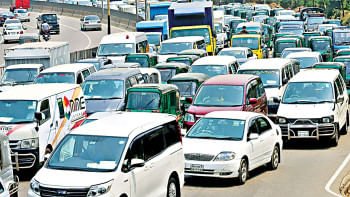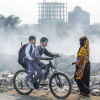World Cities Day 2024: Cities should be for people, not cars

People flock to cities, despite all the traffic congestion and pollution, for a reason: cities offer opportunities that don't exist in smaller towns and villages, whether those be educational, professional or treatment-related. Once in the city, people accept the downsides in return for the benefits. Yet, our grumbling is constant and our ability to institute positive change is far less so.
A lot of factors go into making a city liveable, including affordable housing, decent infrastructure and services (sewage, electricity, waste disposal, etc), abundant open spaces and green spaces, availability of good jobs, education, healthcare, and so on. While safe drinking water is vital, so is clean air; we need not just a decent home but the possibility of sleeping at night as well. The existence of quality schools, healthcare and public space is of limited use if we can't access them safely and conveniently.
Too often, cities are destroyed before they get a chance to deliver a decent life through their overemphasis on mobility, particularly the movement and storage of cars and other motorised vehicles. When we design our cities for the comfort and convenience of cars, it is almost impossible to provide the above-mentioned qualities for people. Cars are simply too expensive, space-consuming, inefficient, polluting and dangerous to be good co-habitants with people.
"Cars were an invention to make our lives better," commented one of my interns the other day. "If they're making our lives worse, shouldn't we reconsider what we have them for?"
Theoretically, cars are a fast way to move about. In reality, as cars become more widely used, traffic congestion increases. While the average traffic speed in Dhaka was 21km/h in 2007, in 2022 it was a mere 4.8km/h. That just happens to be the average walking speed. A cyclist, in comparison, can easily go 30km/h.
Imagine you were in charge of allocating road space for different users. On what basis would you allocate it? Would you give the most to the elite, to the most polluting vehicles, the most space-hogging, the most dangerous? Or would you try to have a fair allocation by the number of trips per mode of vehicles, with a focus on encouraging non-polluting trips and penalising the polluting ones? Surely, an efficient use of road space would factor into your decision.
Looking at the cars piled up on the streets of Dhaka, it is easy to believe that most trips are made by car. In fact, cars account for only a small minority or about 11 percent of the trips. And yet, cars occupy 70 percent of road space. Pedestrians are lucky to get a narrow footpath, and cyclists get no infrastructure at all.
The congestion caused by cars is not just a nuisance; it carries real costs: a loss of 82 lakh working hours daily in the capital due to traffic, or the equivalent of Tk 139 crore.
Wish you had cleaner air to breathe? Air pollution is far higher in motorised streets than non-motorised ones.
And yet, Dhaka and other Bangladeshi cities grow ever more congested, polluted, unsafe and unpleasant. Rather than limiting the number of cars imported and implementing other proven restrictions like charging more for car parking, we actually encourage car ownership through loans, ample free or low-cost streetside parking, and the insistence that apartment buildings and businesses provide, at exorbitantly high cost, free parking. The number of registered private cars up until 2010 was nealy 2.2 lakh; by June 2020, it rose to over 3.7 lakh, according to the Bangladesh Road Transport Authority (BRTA) data. In the same period, motorcycles increased from over 7.5 lakh to nearly 30 lakh. How much more of this can we take?
Officials predict ever-increasing car use and an actual decline in trips by walking. Heaven forbid!
There seems to be an inevitability to all of this. Cars confer status; as incomes grow, so will car use. Those who can't afford a car will buy a motorbike, which causes similar problems. And our cities grow ever more congested, polluted, noisy and miserable each year. Cars occupy an inordinate amount of space and stubbornly refuse to leave.
And yet, modern cities like Copenhagen, Vancouver, Hong Kong and Singapore show that it is possible to control cars and restore liveability to cities: less pollution, less noise, more parks and green spaces, better conditions for walking and cycling, and thus less congestion. Less space and fewer resources devoted to cars also make it easier to deliver all the other amenities that people desire and need in cities.
Surely, as we observe World Cities Day, it is time to greatly restrict the use of private motorised vehicles and make our cities more liveable.
Debra Efroymson is executive director of the Institute of Wellbeing, Bangladesh.
Views expressed in this article are the author's own.
Follow The Daily Star Opinion on Facebook for the latest opinions, commentaries and analyses by experts and professionals. To contribute your article or letter to The Daily Star Opinion, see our guidelines for submission.

 For all latest news, follow The Daily Star's Google News channel.
For all latest news, follow The Daily Star's Google News channel. 











Comments